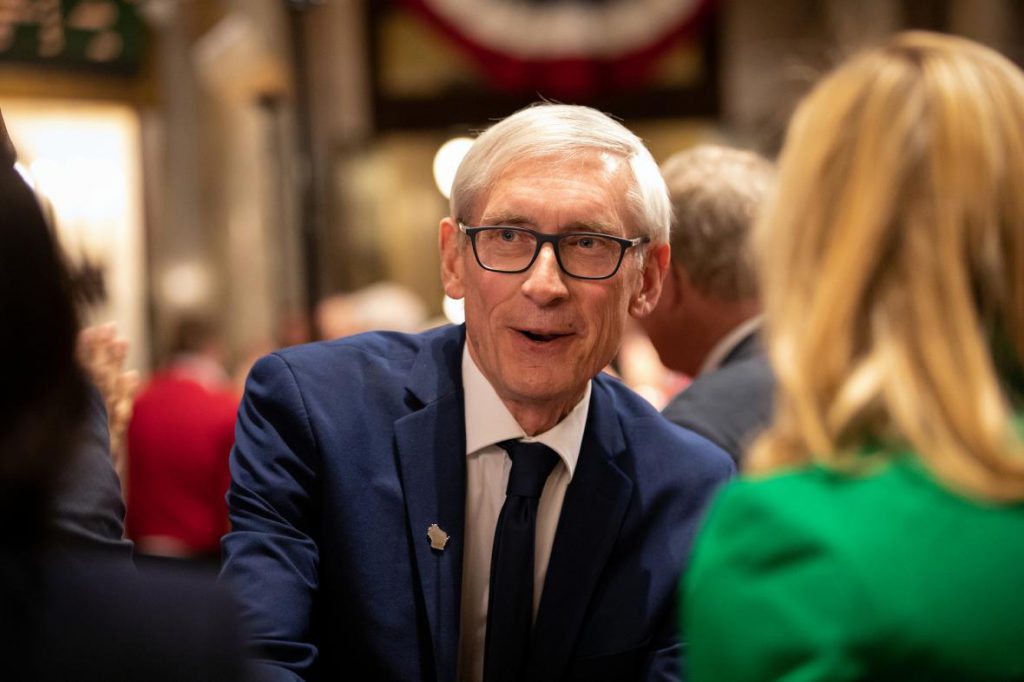Evers Gives 45% of Taxes To K-12 schools
Plus his budget doubles special education funding. Expect a battle with GOP legislators.

Gov. Tony Evers greets members of the Assembly and Senate after giving his first State of the State address in Madison, Wisconsin, at the state Capitol building on Jan. 22, 2019. Photo by Emily Hamer/Wisconsin Center for Investigative Journalism.
There’s one more important Capitol budget debate coming between Democratic Gov. Tony Evers and Republicans who control the Legislature: Should 45 percent of all state tax collections – not counting transportation revenues – go for K-12 public schools in two years?
Some background: Before he was elected governor, Superintendent of Public Instruction Evers submitted a request for $8.08 billion for K-12 schools in the 2020-21 budget. That would have been a 15 percent increase for K-12 schools in two years.
State aid for those schools, including tax credits that hold down property tax bills, totals $7 billion this year, according to the Legislative Fiscal Bureau (LFB).
Spending that much on K-12 could squeeze spending on other critical programs – Medicaid, the UW System, prisons and aids to local governments, for example.
Evers insists that Wisconsin’s one million K-12 school children deserve that $8.08 billion by the 2020-21 school year. “What’s best for our kids is best for our state,” Evers said in his first State of the State message.
But the Wisconsin Institute for Law & Liberty (WILL), a Milwaukee-based conservative legal think tank, disagrees. “More money isn’t the answer,” WILL officials said a new report, Roadmap to Student Achievement. “There are a variety of large and small reforms to improve student achievement and the state should give all Wisconsin students access to more education opportunities.”
Evers said investing more in public schools “will yield dividends for generations,” so state government must again pay two-thirds of K-12 costs.
Campaigning for governor, Evers noted that local voters have supported their K-12 schools by passing a record number of referendums that raised their property taxes. Wisconsin Policy Forum figures show that 457 referendums that spent $5.9 billion on local schools passed in the last five years. That included 141 referendums for $1.97 billion in improvements approved last year.
Republicans question whether state government can afford another Evers priority: An “unprecedented” $600 million more within two years for special education programs.
“We’re also going to make sure that we have resources to support our kids with special needs,” Evers said. The Policy Forum estimates about one out of every seven students have disabilities.
State aid for special education has been frozen at $368.9 million for 10 years. Evers wants $75 million more in 2019-20, and an additional $531 million in 2020-21.
That means Evers wants state aid for special education to more than double – from $368.9 million to $900 million – in two years.
State Senate Majority Leader Scott Fitzgerald, a former cochairman of the Joint Finance Committee, was stunned at the request for $600 million more for one program. “Where is he going to get the money?” Fitzgerald said to reporters after the State of the State speech.
Evers also promised more state aid to close the “achievement gap” – the difference in test score between white and minority students. That gap “is among the highest in the nation in reading and math scores,” he said.
The problem is worst in Wisconsin’s urban school districts, WILL officials said: “A staggering 78% of [Milwaukee Public Schools] students were not proficient in English, and about 83% of students were not proficient in Math… The [four-year] graduation rate hovers around 60%.”
“In Green Bay, only 19.7% of students from low-income families are proficient in English. A staggeringly low 11.4% of African-American students are proficient in English.
“In Madison, only 9.5% of African-American students were found to be proficient in English, and 14.1% of students who were economically disadvantaged were proficient.”
WILL’s suggested reforms include:
Dramatic expansion of the private school Choice program and the number of charter schools. Uniform family income requirements to qualify for Choice. Uniform school district busing policies for public and private school students. New state grants to help private schools expand. Allowing public charter schools to share in new building programs approved by local referendums.
But DPI spokesman Thomas McCarthy dismissed WILL’s recommendations: “Wisconsinites have voiced their strong support for increased funding and a state commitment to our public schools and educators.”
Steven Walters is a senior producer for the public affairs channel WisconsinEye. Contact him at stevenscotwalters@gmail.com
The State of Politics
-
A Wisconsin Political Trivia Quiz
 Dec 15th, 2025 by Steven Walters
Dec 15th, 2025 by Steven Walters
-
The Fight Over Wisconsin’s House Districts
 Dec 8th, 2025 by Steven Walters
Dec 8th, 2025 by Steven Walters
-
The Battle Over On-Line Betting
 Nov 24th, 2025 by Steven Walters
Nov 24th, 2025 by Steven Walters


















